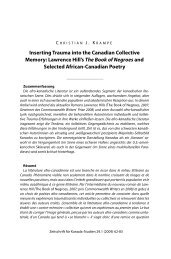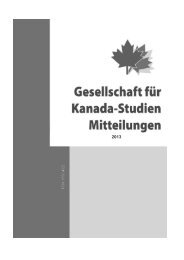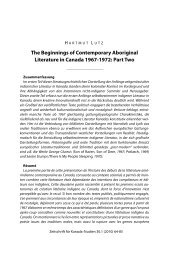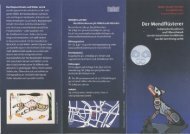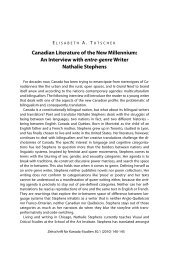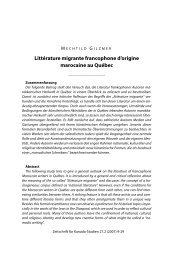The Gradual Instant: An Interview with Anne Michaels
The Gradual Instant: An Interview with Anne Michaels
The Gradual Instant: An Interview with Anne Michaels
You also want an ePaper? Increase the reach of your titles
YUMPU automatically turns print PDFs into web optimized ePapers that Google loves.
148 Gordon Bölling<br />
Translated as Wintergewölbe the novel is scheduled for release in Germany in late<br />
April 2009. As <strong>Michaels</strong> explains at the reading, the novel takes its title from a type<br />
of building in which the bodies of the dead are stored in winter when the ground is<br />
frozen so hard that it is impossible to bury them.<br />
<strong>An</strong>ne <strong>Michaels</strong> was born in Toronto in 1958. Prior to her success as a novelist, she<br />
had made a name for herself as a poet. Her first volume of poetry, <strong>The</strong> Weight of<br />
Oranges (1986), won the Commonwealth Prize for the Americas. Half a decade later,<br />
her second collection of verse, Miner’s Pond (1991), received the Canadian Authors<br />
Association Award for Poetry and was shortlisted for the Governor General’s Award<br />
and the Trillium Award. <strong>The</strong>se two volumes were reissued in a single-volume in<br />
1997. Skin Divers (1999) is her most recent book of poetry. <strong>Michaels</strong> also received<br />
international critical acclaim for her first novel. Fugitive Pieces, published in 1996,<br />
won the Chapters/Books in Canada First Novel Award, <strong>The</strong> City of Toronto Book<br />
Award, the Martin and Beatrice Fischer Award, the Trillium Book Award, an Award of<br />
Merit from Heritage Toronto, the Guardian Fiction Award, the Jewish Quarterly Prize<br />
for Fiction, the Orange Prize for Fiction, the Lannan Literary Award for Fiction, the<br />
Harold Ribalow Award, and the Giuseppe Acerbi Literary Award.<br />
Her German publisher, Berlin Verlag, has organized a tight schedule for <strong>Michaels</strong><br />
and as I meet her in the lobby of the Hotel im Wasserturm in central Cologne she<br />
has already done a day’s worth of press work. Despite the strains of travel, a full day<br />
of interviews and that night’s upcoming reading at the lit.Cologne 2009 Festival of<br />
Literature, she is happy to do an additional interview <strong>with</strong> an academic journal.<br />
When interviewed, <strong>Michaels</strong> often pauses for a moment before she answers a specific<br />
question in what is a reflective and calm voice.<br />
Gordon Bölling: You began your career as a writer of poetry and only later moved<br />
on to fiction. A similar pattern can also be traced in the biographies of Leonard<br />
Cohen, Margaret Atwood, and Michael Ondaatje. Is there a special reason why so<br />
many of Canada’s major authors began their careers as poets?<br />
<strong>An</strong>ne <strong>Michaels</strong>: I’m not sure one could generalize. I think that for me there came a<br />
point where I couldn’t do what I needed to do in that form. My task was different<br />
and so I couldn’t do what I needed to do in poetry. I can’t speak for the others. But<br />
for me there are certain large questions which I knew, in order to be truthful to the<br />
complexity of the questions and because some of those questions were very difficult<br />
to look at or questions which we maybe desire not to look at too closely, that I<br />
would have to unfold them over many pages. Being <strong>with</strong> the reader over two hundred<br />
or four hundred pages, one can unfold things differently and lead both the<br />
writer and the reader into places, difficult or painful places, because you have the<br />
time to do it. A poem doesn’t allow you that.<br />
GB: Even though some of your poems might be read as long poems?



